Ecosystems
IER's ecosystem group focuses on radioecological field studies within the human exclusion zones of Fukushima and Chernobyl. "Radioecology" is a scientific discipline that studies the movement of radionuclides in the environment, and the effects of the environmental radiation on plants, animals and humans. We are taking a systems approach to our research by linking molecular, individual, population and community level impacts from radiation exposures. We recognize that many confounding variables in field research can cause bias when interpreting research data. For example, the evacuation and resettlement of humans is likely having a profound effect on populations of wildlife. Thus, the dynamics of human residency in the contaminated zones will need to be a co-factor to consider when determining the effects of radiation on populations of wildlife, such as wild boar. Our group is also specializing in methods to measure radiation dose to free-ranging wildlife. Improved dosimetry is not only important for critical evaluation of long term radiological effects on wildlife populations, but also for assessing potential health effects to humans as they repopulate evacuation zones.
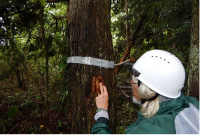 |
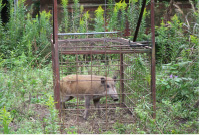 |
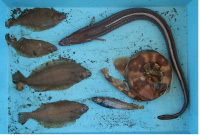 |
Activity Log
 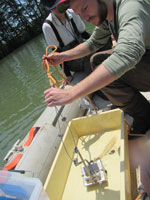 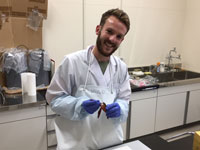 |
20 June - 21 August 2017 | |
| Neil Fuller, a Ph.D. student at the University of Portsmouth (UoP), UK, spent this summer in Fukushima and carried out his thesis research at IER (led by Prof. Jim Smith, UoP, and Dr. Toshihiro Wada, IER). Funded by JSPS Summer Program 2017, Neil's research investigated the effect of low-dose radiation on crustacean species. Neil performed morphological radiocesium analyses in mitten crabs collected by Dr. Wada from irrigation ponds within Fukushima's highly contaminated area. [↖ Neil and other international students attended a lecture held at Fukushima Prefectural Fisheries Experimental Station.] [← Sampling at an irrigation pond] [↙ Neil in a lab at IER performing sample measurements] |
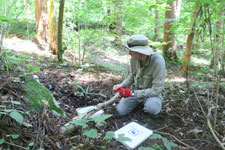 |
20 June - 23 August 2017 | |
| Daniel Workman, Colorado State University, carried out an extensive research at IER for his Master degree (led by Prof. Tom Johnson, CSU, and Dr. Vasyl Yoschenko, IER). The research was supported by JSPS within the framework of JSPS Summer Programm 2017. The main aim of the research was elucidation of the factors governing variability of the radiocesium soil-to-plant transfer factors for the understory plants. The research included sampling of soil and several plant species at the IER experimental sites in the Fukushima zone, development of the method for extraction of roots from the bulk soil samples, characterization of the plant root systems, and lab analyses of the chemical forms of cesium isotopes in soil. |
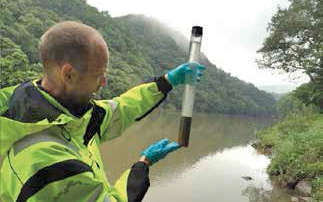 |
21 - 29 September 2016 | |
| Ten Norwegian scientists from the University of Life Sciences (NMBU) joined IER researchers (led by Dr. Toshihiro Wada) for an extensive sampling of fish, water and sediments in various rivers and lakes within the Fukushima Prefecture. The collaboration is providing data on the movement of radioactive cesium within aquatic ecosystems. |